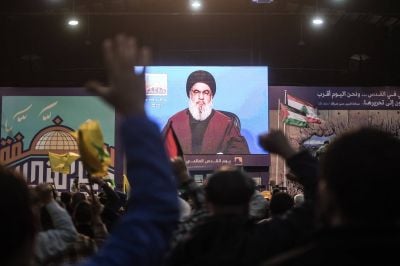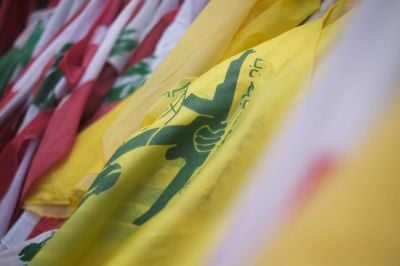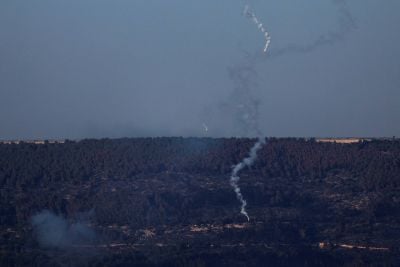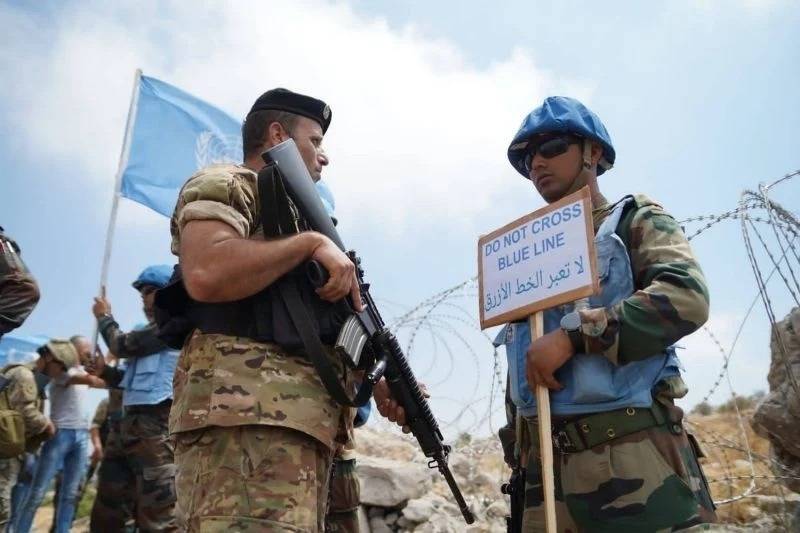
Lebanese soldier, left, and UNIFIL peacekeeper in Kfar Shuba, South Lebanon, Aug. 26, 2023. (Credit: Mohammad Yassine/L'Orient Today)
For the first time since cross-border fighting between Israel and Hezbollah started on Oct. 8, Israeli artillery killed a Lebanese soldier on Tuesday.
The incident, which took place in Adaisseh, Marjayoun district, also injured three other soldiers.
So far, the Lebanese state, including its army, has remained committed to UN Resolution 1701, which calls for no hostilities on the border and has not engaged in any clashes with Israel.
But Tuesday’s killing raises questions over what could happen if it did.
Lebanon finds itself ensnared in a geopolitical web of long-standing hostilities with its southern neighbor, Israel.
Beyond the traditional inter-state conflicts, the intricate tapestry of regional dynamics is further complicated by the presence of the Iran-backed paramilitary organization, Hezbollah, deeply entrenched within Lebanon's borders — and its state apparatus.
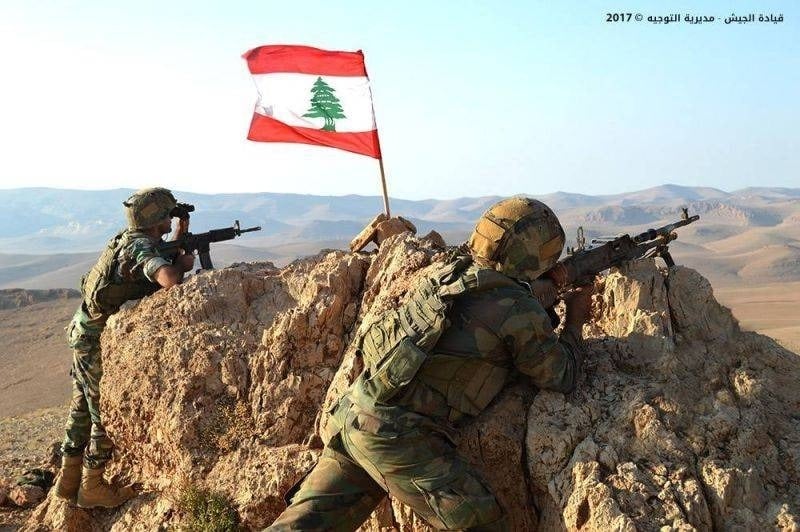 Lebanese soldiers on the border with Syria. (Credit: Illustrative Photo/Lebanese Army)
Lebanese soldiers on the border with Syria. (Credit: Illustrative Photo/Lebanese Army)
In contrast, the Lebanese Army grapples with resource limitations, including outdated equipment, insufficient funding and even food shortages, hindering its ability to modernize and keep pace with evolving security threats.
Is the Lebanese Army capable of confronting Israel, in case the latter launches a full offensive against Lebanon, without relying on the military prowess of Hezbollah? And if not, can Lebanon truly be considered a sovereign state?
Is Lebanon a sovereign state with Hezbollah calling shots?
Retired Army General Khalil Helou contends that Hezbollah's independent decision-making on matters of defense compromises Lebanon's sovereignty.
“There is no room to continue the conversation with the group that believes Hezbollah is defending Lebanon, because in this case, we cannot consider Lebanon a sovereign state,” he says.
The signing of the 1969 Cairo Agreement, after talks between the then-Lebanese Army commander, General Emile Bustani, and Palestinian Liberation Organization leader Yasser Arafat paved the way for the PLO to operate and carry out attacks from south Lebanon, security and defense analyst Riad Kahwaji tells L’Orient Today.
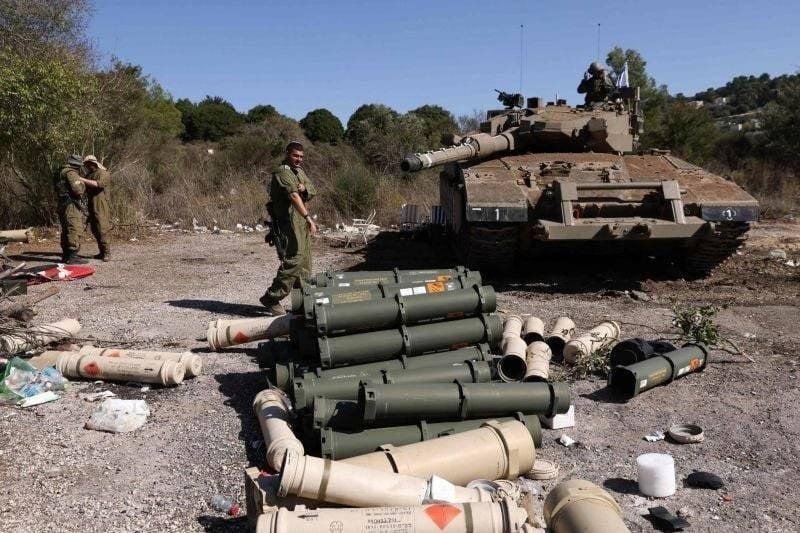 Israeli soldiers, on their Merkava, at a location not far from the Lebanese border, Oct. 21, 2023. (Credit: Jalaa Marey/AFP)
Israeli soldiers, on their Merkava, at a location not far from the Lebanese border, Oct. 21, 2023. (Credit: Jalaa Marey/AFP)
“This made the Lebanese Army lose [its] monopoly on the use of military power,” he says. “You cannot have sovereignty when the armed forces, Lebanon’s legitimate armed forces, do not have monopoly over the use of force.”
“Today, Hezbollah is saying, ‘I am the only one who can fight Israel. I am the only one who is allowed to fight Israel. Nobody else is allowed to be in the south without my permission,’” Kahwaji claims.
“Hezbollah holds control on war and peace decisions. This is not a normal thing in a modern-day state. It violates all the international norms when it comes to the definition of sovereignty and a modern state and today's global governance,” Kahwaji adds.
Signed in 1989, the Taif Agreement marked the end of the Lebanese Civil War as rival officials negotiated in Taif, Saudi Arabia.
The agreement’s clause that calls for disarming all militias, was implemented on several armed groups in Lebanon, save for Hezbollah.
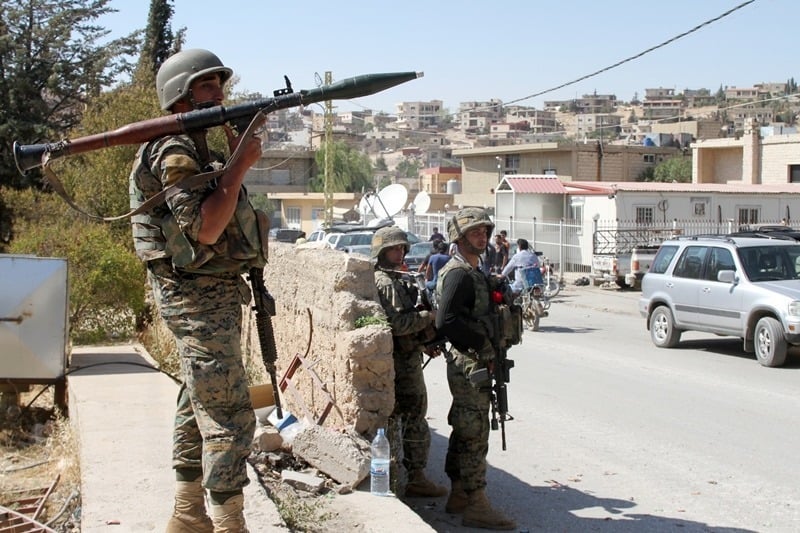 Lebanese troops stand guard in a street in the eastern Lebanese town of Arsal, on the border with Syria, a day after the Lebanese army began deploying into the town, Aug. 9, 2014. (Credit: AFP)
Lebanese troops stand guard in a street in the eastern Lebanese town of Arsal, on the border with Syria, a day after the Lebanese army began deploying into the town, Aug. 9, 2014. (Credit: AFP)
Besides ending the war, the agreement, mediated by Saudi Arabia and influenced by various countries, also aimed to reform the political system and reclaim the Lebanese state’s authority in South Lebanon, employing its own armed forces.
At the behest of a weak state
Helou discredits the misconception that Lebanon’s security falls only within the hands of the Lebanese Army or that it operates autonomously.
Instead, that responsibility lies with the state and its various agencies.
“The Lebanese Army is governed by laws — the national law, the general military system, the decisions of the defense minister, and the constitution,” he explains, adding that “the army is also subject to the authority of the Cabinet and its legislations. Otherwise, it becomes a group like Hezbollah.”
A glaring shortcoming in Lebanon's defense posture is the absence of a coherent and comprehensive defense policy and strategy. “A defense plan is not just about military tanks and gunpowder,” Helou says.
The Supreme Council of Defense, which includes Lebanon’s president, prime minister, defense minister and others, is responsible for strategic policy.
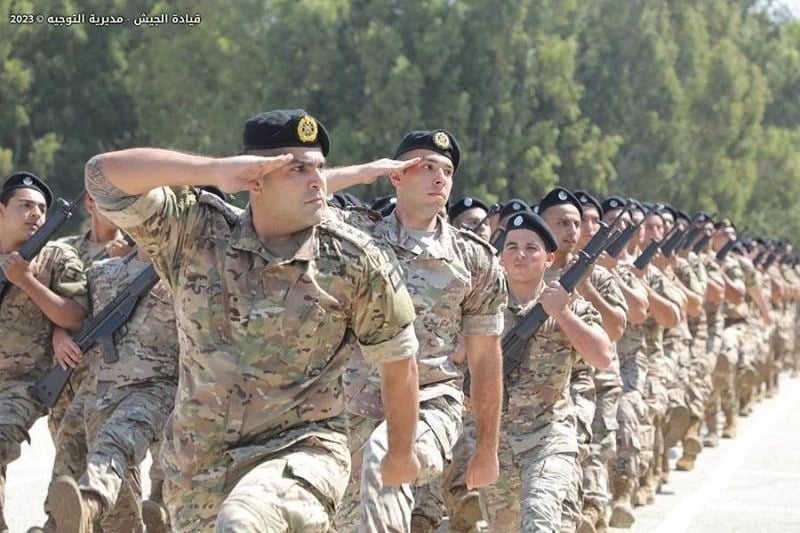 New Lebanese army recruits at a military parade, June 22, 2023. (Credit: Twitter/@LebarmyOfficial)
New Lebanese army recruits at a military parade, June 22, 2023. (Credit: Twitter/@LebarmyOfficial)
Yet Lebanon currently has no president and all of its ministers are serving merely in a caretaker capacity.
But in fact, Lebanon failed to prioritize devising a defense strategy since the country’s independence in 1943, rendering the army directionless.
Kahwaji says the current fighting against Israel in south Lebanon continues “without the knowledge of the government or its consent, without a role being played by the armed forces or the Ministry of Defense.”
“In Lebanon, we have the illusion of a state. It's a failed state, by all means."
Could the army put up a good fight anyway?
The Lebanese Army is equipped for defensive engagements against Israel but not for a full-scale war, given Israel's formidable military strengths, including nuclear power, Kahwaji tells L’Orient Today.
Comparing the Israeli and Lebanese army apparatuses, the number of personnel in the Lebanese Army is estimated to be around 84,000 while Israel’s military force consists of 169,500 active personnel across the army, navy, and paramilitary.
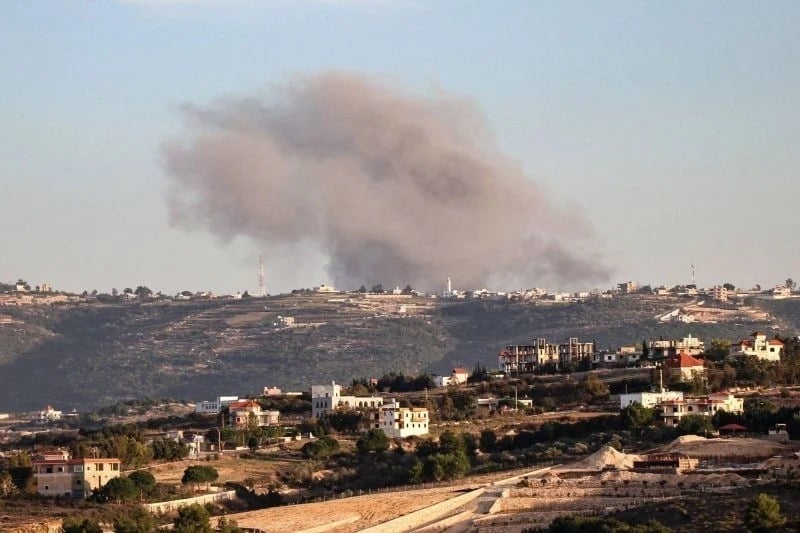 Smoke rises above the localities of Qaouzah and Ramieh, in Lebanon-South, after an Israeli air raid, Dec. 3, 2023. (Credit: AFP)
Smoke rises above the localities of Qaouzah and Ramieh, in Lebanon-South, after an Israeli air raid, Dec. 3, 2023. (Credit: AFP)
Additionally, the reserve forces comprise 465,000 individuals, with an additional 8,000 serving in the paramilitary sector.
That said, Lebanon has a history of successfully engaging in low-intensity conflicts and guerrilla warfare with Israel, as seen in the 60s and 70s, according to Kahwaji.
“Hezbollah is not the first entity in Lebanon to fight the Israelis,” he says.
During Israel’s land invasion of Lebanon in 1978, the army devised a defensive policy aimed at buying time for diplomatic interventions from the UN Security Council and the Arab League to secure a ceasefire successfully, Kahwaji notes. Eventually, Resolution 425, which called on Israel to immediately withdraw its forces from Lebanon and established the United Nations Interim Force In Lebanon (UNIFIL), was passed.
In later years, “we saw the army put on a formidable operation against ISIS, for example,” Kahwaji says.
In 2017, the Lebanese Army launched the successful “Dawn of the Hills” campaign against 600 ISIS militants hiding in bunkers, caves and tunnels within a desolate mountainous region near Arsal, a remote Lebanese village situated along the eastern border with Syria.
“Hezbollah inserted itself at the end just to show it was not the achievement of the Lebanese Army — that they had something to do with it, which was not true.”
But ISIS was a sub-state actor hiding out in caves. What about Israel?
Kahwaji believes that “no one can really fight Israel — what we see between Israel and Hezbollah is a trade of punches.”
“Israel can bomb the hell out of Beirut if it wishes to do so. And nobody can stop it… no matter how many missiles Hezbollah has,” he adds.
“If [Israel and Hezbollah] have a go at each other, the size of devastation in Lebanon will be 100 times, if not more, bigger, much worse than Hezbollah's missiles would be able to inflict inside Israel.”
Though Hezbollah has, over the years, undeniably improved its weaponry, its technical proficiency and its ability to cause significant damage, according to Kahwaji, “there is no way we can say that there is a parity today between Hezbollah and Israel.”
Military aid from Israel’s ally: A strategic paradox?
“Had the United States not been providing the [Lebanese] army with weapons, ammunition and money, there would have been no army,” Helou says.
This financial dependency raises concerns about Lebanon's ability to defend itself in the absence of external support.
The US, an ally of Israel, provides military assistance to the Lebanese Army, as well as several other countries, including Egypt, Jordan and — of course — Israel.
The multi-year economic crisis in Lebanon further put the Lebanese Army in a precarious situation. But Helou says that the army’s circumstances are not just due to the crisis — “it has been the case for decades.”
“We have been relying on American aid since at least 1990,” he adds.
Since 2006, the US aid to the Lebanese Army has totaled more than $3 billion, according to the US Department of State, making it the main donor to the Lebanese Army.
Occasionally, other countries also donate to the Lebanese Army, including Qatar, Italy, France and the UK.
In parallel, the US has recently passed a plan providing Israel with $14.3 billion in aid from its national security package that included funding for both Israel and Ukraine. The aid is aimed at providing security support to Israel amid its war with Hamas.
The US aid Israel has received annually, which is almost $4 billion, has helped it develop one of the most advanced militaries in the world.
“When the [Lebanese] state does not provide the army with a budget to arm itself, how do you expect it to defend Lebanon against Israel?” the retired general said.
At the same time, the Lebanese Army remains committed to UN Resolution 1701, which prohibits it from deploying its defensive equipment in the south.
“It is committed to achieving a ceasefire, supported by UNIFIL, to restore the state’s sovereignty,” Helou explains.
Any scenario in which Lebanon violates Resolution 1701 and faces Israeli retaliation would expose the weaknesses in the Lebanese Army's air defense system and the potential toll on personnel, Helou says.
“The army would not be able to take down any Israeli aircraft.”
“But the army can use other tactics: if Israel invades, it can carry out military operations against it as it has carried out other operations against other factions.”
Herein lies the paradox: since Lebanon receives aid from the US, an ally of Israel, can its army use these weapons against Israel?
“The army does not wait on the Americans to tell it if or when it can defend Lebanon,” Helou claims. “Defending Lebanon is its duty.”
However, one crucial aspect remains an obstacle.
Israel has dropped more than 25,000 tons of explosives onto the Gaza Strip between Oct. 7 and early November, equivalent to two nuclear bombs, according to the Euro-Med Human Rights Monitor.
“[Israel] wouldn’t have been able to do so had the US not been supplying it along the way,” the former general details, adding that “when the battle of Nahr al-Bared began in 2007, which I was honored to participate in, the Americans immediately supplied us with weapons, which arrived in Lebanon by planes. Had it not been the case, we would have been able to fight for just one day,” he reveals.
The battle took place when the army launched its assault in the Nahr al-Bared camp against armed militants, centering in and around the Nahr al-Bared Palestinian refugee camp just outside Tripoli.
As with the 2017 fight against ISIS, the 2007 battle was merely against a sub-state armed group.
“So, if the army confronts the Israelis today, and runs out of ammunition after three and four days, what will it do then?”
